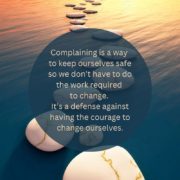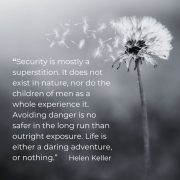Humanizing Your Organization – The Power Of Caring Stewardship
On a recent errand to the hardware store I was between meetings and impatient, rushed, and abrupt with the cashier. She was trying her best but I was frustrated with having to wait through the long line up, and tense about missing my next appointment. It wasn’t long afterwards that I became uncomfortable with my interaction. I teach others to treat people as human beings, not as objects. But what did I do with this cashier? Just that. With one small mindful decision, I could have had an entirely different transaction. Instead of seeing this young woman as a cashier, with a small act of caring, I could have seen her as a fellow human being with hopes and feelings and a life away from work – perhaps a college student paying her way through school, or someone’s daughter or girlfriend. My response to her would have been gentler, kinder, and more supportive and caring.
I believe that it is these small actions and responses that reap the big results when it comes to creating the cultures where we work and live. In large systems, when people get treated as objects, or numbers, or cogs in a machine, they start acting like objects, and in turn treat others like objects, and you create a vicious, dehumanizing circle of low trust and disrespect, while losing contact with human touch and human potential.
Here are four ways to humanize your organizations and your life:
- Before interacting with anyone, whether it’s a clerk, direct report, cab driver, boss, customer, or family member, take a moment to see beyond a role or label that reduces them to an object. Instead, try seeing them as a human being with feelings, needs, worries, values, and aspirations. Try this for one day and track the difference it makes in your interactions. Notice how when you change the way you look at people, the people you look at change. It’s about caring.
- Maintain personal integrity. Self-respect comes from trusting yourself to keep a promise to yourself – even in the face of discomfort, insecurity, and disapproval. The result of greater self-respect is inevitably higher trust – of yourself and others. You can’t treat others with dignity and kindness unless you have it within you. When you are a better person, the world around you is better for it.
- Create a little more space in your day. Had I taken responsibility to take a few things off my to-do list and arrived at the store with more space in my day, it would have been easier to be more patient and kind with this cashier. We all seem stressed with the demands we take on these days. It is irresponsible to make your lack of planning someone else’s suffering.
- Bring gratitude to your life. Gratitude transforms coldness into kindness, impatience into peace, self-interest into service, and entitlement into commitment. Gratitude gives you the freedom to grant grace to yourself and others, especially when we are all under pressure. Gratitude changes everything.
When you take ownership for your part of the environment where you work and for your relationships, and thus committing to making the world a better place by your presence, you are what I call the Cultural Stewards. Like leadership, stewardship is not a title or position. It is a presence – a decision. Stewardship is nothing less than deciding to be the trusted guardians of the organization and its people, products, and experiences. Traditionally, stewards were entrusted with the care of the estate while the baron was in absentia, and were thus charged with the health, vitality, and survival of the estate (even the care of the baron’s own family). Stewardship, therefore, is no lightweight title. Taking this kind of ownership – without blame, demands, guilt, or criticism – breathes new life into the environments where you spend your life, and makes those places a whole lot more enjoyable.









